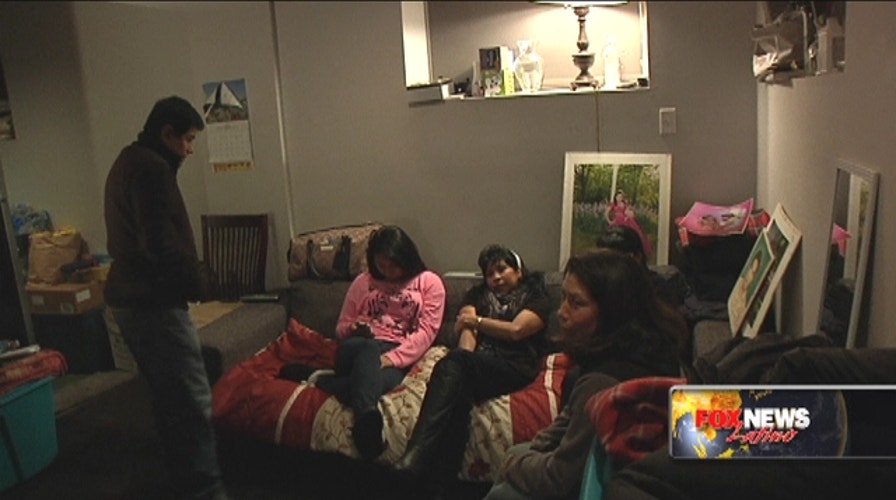Months After Sandy, Undoc. Immigrants Struggle
Months after Hurricane Sandy, undocumented immigrants in Staten Island are living in overcrowded homes, apartments, and basements.
STATEN ISLAND – Vanessa Ramos does her homework in the bathroom. Family dinner is served on a folded table, a checkered green cloth adding a homely feel. She jostles with eight others for television time, though adults have first-dibs because telenovelas rule. No more than two at a time are allowed in the kitchen.
This is the new reality for nine undocumented immigrants whose lives were uprooted after “Superstorm” Sandy demolished their Staten Island rented homes last year. For three months since the devastating hurricane struck the region, they have lived in a tiny, one-bedroom basement underneath a two-story home.
The clean but cramped basement was designed for a college student. But today, it's home to sisters Concepcion Ramos, Belen Espino, Elizabeth Ramos and their families. The bathroom and kitchen are attached to a room where five children share two beds and their clothes are stuffed in garbage bags. Uncle Zibeon, Elizabeth Ramos' husband, is the man of the house.
"It seems like everyone wants to take a shower at the same time," said Vanessa Ramos, 22.
Superstorm Sandy killed 94 people and left dozens homeless after its 14-foot storm surge flooded streets and swept away homes. But for undocumented immigrants, who have feared turning to the federal government for help fearing they’ll be arrested and deported, the recovery from the storm has been particularly harsh.
Finding themselves without financial support, and their friends and family facing a similar dilemma, undocumented immigrants have been forced to cram into homes — sometimes 20 at a time — in basements or apartments across Staten Island. Most are renters and, mostly working off the books since they’re in the country illegally, they don’t have access to government benefits like unemployment.
“Families have children sleeping on the floor because they don’t have mattresses, there is overcrowding, because most of the immigrant families that evacuated did not go to shelters," said Gonzalo Mercado, executive director of El Centro Del Inmigrante, an advocacy organization that doubles as a hub for undocumented immigrants. "We visited the shelters after the storm to find Latino families and we found one or two."
The number of Hispanic Staten Islanders has grown by 51 percent over the past 10 years to an estimated 81,501, according to the 2010 U.S. Census. The number of undocumented immigrants is unknown.
Mercado said many undocumented immigrant families are still coming out of hiding and quietly asking for assistance. Many of them are still unaware that they may qualify for FEMA federal disaster relief.
"I think FEMA didn’t know how to work with undocumented families," Mercado told Fox News Latino. "I think there was a lot of disconnection, in the beginning we were getting mixed messages, if you were undocumented you could not apply, then it was if your son is a citizen you could apply, then it was broader, if someone in the household has a Social Security number they could apply."
A FEMA spokesperson told Fox News Latino that emergency cash aid is available to undocumented families as long as anyone within a given household, regardless of familial relationships, has a valid Social Security card.
Ramos’ mom, Concepcion, 51, an undocumented immigrant who cleans houses, said she lost almost all of her life savings when her rental home was destroyed and wiped away all the cash she had been saving up for years.
"I forgot my money," she said. "I thought if I took all my money I would lose it so I left half, and took half... I wanted to buy my daughter a car, a house."
She recovered some of the money after she filed a FEMA relief claim.
Mercado said the federal government needs to become increasingly aware of the new dynamic in the undocumented immigrant community, which is increasingly made up of mixed status families — some relatives in the country illegally, others with work visas, permanent residents or even U.S. citizens.
"FEMA needs to work with organizations on the ground that have that type of interaction,” Mercado said. “They need to have the trust of vulnerable communities like the undocumented community.”
The confusion kept many undocumented families away from shelters and government help and instead they relied on one another. Families helped families.
But navigating the bureaucratic process involving seeking governmental agency help was not an easy feat.
Dulce Espino, 18, an undocumented immigrant waiting for her temporary work visa under Obama’s Deferred Action program, said it was frustrating trying to receive government help by applying through her 8 and 14-year-old brothers — the only U.S. citizens in the family. She would have preferred to apply herself, but couldn’t do it because she did not have a Social Security card.
“It’s hard, it’s not easy, it’s not fair,” said Espino said. “I wish I could help my mom more. But I can’t because I’m missing that number, that piece of paper.”
The three sisters and their families plan to move out of their shared basement in March. They’re all hoping to return to normalcy by finding their own homes.
Follow us on twitter.com/foxnewslatino
Like us at facebook.com/foxnewslatino

